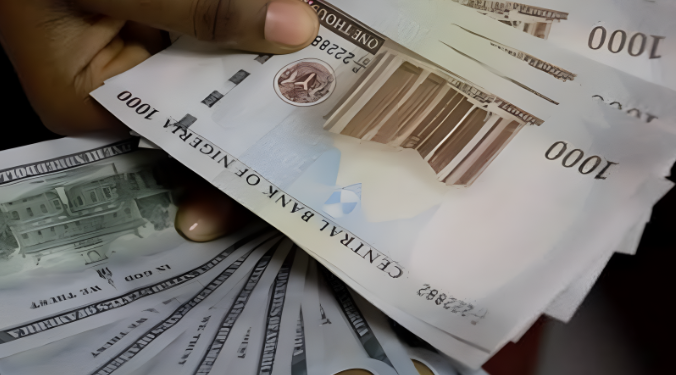The federal, state, and local governments in Nigeria collectively earned around N2.74 trillion in revenue from exchange gains during the first six months of 2024. Data from the Federation Account Allocation Committee (FAAC), as reported by the National Bureau of Statistics (NBS), highlight this significant boost in revenue.
The total revenue from exchange gains in the first half of 2024 surged by approximately 1,494% compared to the N171.91 billion recorded during the same period last year.
Impact of Exchange Rate
This dramatic increase in revenue is largely attributed to the unification of Nigeria’s exchange rates and the devaluation of the naira, which significantly bolstered government earnings from exchange gains. These gains differ between the exchange rate assumed in the budget and the actual rate at which applicable revenue streams are converted at FAAC.
The depreciation of the naira has become a major revenue driver for the government in Naira terms, contributing 22% to the total revenue of N12.45 trillion during this period. However, this increase in revenue comes with the challenge of rising governance costs as Nigeria grapples with high inflation and weakening purchasing power.
In response to the inflationary pressures, labour unions have agreed with the government to raise the minimum wage from N30,000 to N70,000 monthly.
Federal Government Takes the Lion’s Share of Exchange Gains
The N2.74 trillion in exchange gains was distributed among the Federal Government, State Governments, Local Government Councils (LGCs), and the 13% Derivation Fund, following a sharing formula approved by the Revenue Mobilization Allocation and Fiscal Commission (RMAFC).
Before the revenue is shared among the three tiers of government, statutory deductions, including the 13% derivation, are made. After these deductions, the Federal Government receives 52.68%, State Governments receive 26.72%, and Local Governments get 20.60% of the net distributable revenue from the federation account.
From the Federal Government’s share, 1% is allocated for general ecological problems, another 1% for the Federal Capital Territory (FCT), 1.68% for developing natural resources, and 0.5% for statutory stabilization. The remaining 48.5% is allocated to the Federal Government.
According to the data, the Federal Government received the largest share of the exchange gains, amounting to N1.12 trillion over the six months. This represents 41% of the total exchange gains and 9% of the total revenue for the period. State Governments collectively received N567.08 billion from exchange gains, while Local Government Councils were allocated N437.20 billion. The 13% Derivation Fund, which benefits oil-producing states, received N283.77 billion, accounting for 10% of the exchange gains.
Strategic transfers were also made to the non-oil Excess Crude Account, with N330 billion allocated across three months—February, March, and June. This amount is about 12% of the total exchange gain revenue for the period.
Highest Exchange Gain Shared Revenue Recorded in March
March 2024 saw the highest single-month exchange gain of N657.44 billion, making up 28.3% of that month’s total shared revenue. This was largely driven by significant naira depreciation and increased foreign exchange inflows.
In January 2024, N287.74 billion in exchange gains was distributed, representing 17.2% of the total revenue for the month. This figure nearly doubled in February to N479.03 billion, making up 23.2% of that month’s revenue. April and May saw a relative decrease in exchange gains, with N285.52 billion and N438.88 billion, contributing 15.3% and 20% to the total revenues of those months, respectively. However, June witnessed a resurgence, with N587.46 billion in exchange gains, accounting for 25.3% of the month’s total shared revenue.
Things To Note
About two weeks after President Bola Tinubu pledged to unify Nigeria’s multiple exchange rates, the Central Bank of Nigeria (CBN) floated the naira at the Investors and Exporters (I&E) forex window, now known as the Nigerian Autonomous Foreign Exchange Market (NAFEM).
Since then, the naira has experienced significant volatility, fluctuating between N1,560/$1 and N1,600/$1. The naira depreciated by 40% between the end of December 2023 and June 2024, closing the first half of the year at N1,503/$1.
The N2.74 trillion boost from exchange rate differences has provided much-needed relief to the government’s finances, allowing for the continued funding of critical expenditures despite broader economic challenges. This 22% contribution to total revenue underscores the significant role that currency fluctuations have played in bolstering government revenue this year.
However, this reliance on exchange gains raises concerns about sustainability, as such gains depend on external factors rather than robust economic fundamentals.
The Institute of Chartered Accountants of Nigeria (ICAN) previously stated that unifying the country’s exchange rates would stimulate the growth of the securities market and attract foreign investments. It also noted that this unification would increase government revenue in naira terms, resulting in a higher tax/revenue to Gross Domestic Product (GDP) ratio.
While the weakened naira has benefited the government and some banks, it has negatively impacted many manufacturing companies in Nigeria, leading to significant foreign exchange losses in their financial statements.











